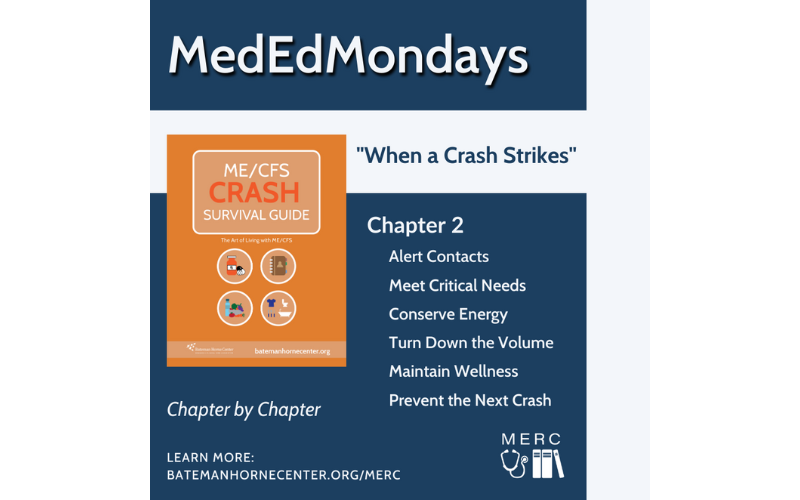This blog post covers the second chapter of the ME/CFS Crash Survival Guide. The information provided can also apply to individuals with long COVID and other multi-system chronic complex illnesses that have a PEM component.
Click here to download the entire guidebook.
Chapter 2: When a Crash Strikes
This chapter can serve as a stand-alone handout to share or reference when in a crash. Select information is repeated or expanded upon in each chapter of the guidebook.
- Alert Emergency Contacts
- Meet Critical Needs
- Conserve Energy
- Turn Down the Volume & Recover
- Maintain Wellness
- Prevent the Next Crash
Step 1. Alert Emergency Contacts
Inform your emergency contacts and ensure they have access to any pertinent health information in case they need to act on your behalf.
- Ask your contacts to check on you periodically with the understanding that you may not be able to engage in conversation at various stages of your recovery.
- Have medication cards with medical provider contact information, a list of your known diagnoses and allergies in your bedside Crash Care Kit, purse or wallet, and on your refrigerator.
Step 2. Meet Critical Health Needs
Have your critical crash care needs prepared at your bedside. See the Crash Care Kit Essentials sheet for a quick one-page checklist.
Vitals
- Automated blood pressure cuff
- Pulse oximeter (measures oxygen and heart rate)
- Thermometer
- Watch/device to measure heart rate and allow you to reference date/time
- Life Alert or have the means to contact emergency services (if warranted)
- Medical bracelet
Hydration
- Bottled water and pre-made bottles with rehydration solution
- Electrolyte drinks (such as Gatorade, Powerade, etc.)
Nutrition
- Consider foods that can be consumed in various ways (chewed, drank, sucked on).
- Avoid foods that trigger known intolerances or mast cell response.
Medication
- Medication and allergy cards
- Pill reminder alarms
- Pill boxes
- Set aside as needed (PRN) medications and indicate why you take them.
Communication devices and cards
- Pre-made cards that communicate essential needs
- Devices that can be utilized in place of speaking: phone, iPad/iMac, laptop
- Keep your communication devices charged.
Step 3. Conserve Energy
Aggressively minimize all movement and activity
- Delay unnecessary tasks
- Delegate tasks to others
- Decrease speed and frequency of movements
- Stage environment (in advance) to accommodate for rest breaks if/when movement is necessary.
- Have your Crash Care Kit by your bedside to ensure critical needs are met.
Step 4. Turn Down the Volume & Recover
Decreasing environmental and physiological stimuli can help you conserve energy and recover sooner. Consider the following ways to minimize external energy demands.
Sensory and environmental stimulus
- Vision (lights, sunlight, device lights, reading, watching media)
- Sound (excess, recurrent, overstimulating noise)
- Touch (clothing, sheets, physical touch, points of pressure)
- Odors (good and bad)
- Ambient temperature
- Chemicals
Brain events
- Cognitive demands (working, talking, reading, processing TV shows, conversations)
- Emotional stressors (positive and negative emotions utilize significant energy)
Physiological fluctuations (may occur in a crash and need periodic attention)
- Body temperature
- Metabolism
- Heightened reactivity to normally tolerated food, medications, environment, etc.
- Body positioning
- Headache and neuroinflammation
Step 5. Maintain Wellness
It can be easy to fixate on what caused the crash or engage in self-blame, but this will not help your emotional, cognitive, or physical energy recuperation. Instead find ways to practice self-compassion and wellness to expedite your recovery.
Step 6. Avoid the Next Crash
While crashes are an inevitable part of ME/CFS, it is important to try and avoid continual push-crash cycles and prolonged deep crashes. Think of these as an injury to your body, and the more severe the injury the harder it is for your body to recover. Be patient with yourself as you learn your thresholds and don’t beat yourself up if you go into a crash. That’s why you have your pre-made Crash Care Kit full of your essentials to help you through it!
This blog post covers the second chapter of the ME/CFS Crash Survival Guide.
Click here to download the entire guidebook.
The information provided can also apply to individuals with long COVID and other multi-system chronic complex illnesses that have a PEM component.
Bateman Horne Center and Open Medicine Foundation are partnering to educate
medical professionals about multi-system chronic complex diseases.
If you find this content helpful support our work by donating today!

 Lucinda Bateman, MD, is a renowned clinician, researcher, and educator. Her Johns Hopkins University Medical School training instilled an approach to care that she has employed throughout her career - the patient comes first and the unknown or unexplained does not equate to a lack of proper and compassionate care. Since starting her own practice in 2000, she has served on six boards or committees, been the principal investigator for 45 studies, authored/coauthored 40 journal articles, served as adjunct instructor and adjunct assistant professor in the University of Utah Departments of Preventative Medicine, Internal Medicine, and Anesthesiology, and lectured around the world.
Lucinda Bateman, MD, is a renowned clinician, researcher, and educator. Her Johns Hopkins University Medical School training instilled an approach to care that she has employed throughout her career - the patient comes first and the unknown or unexplained does not equate to a lack of proper and compassionate care. Since starting her own practice in 2000, she has served on six boards or committees, been the principal investigator for 45 studies, authored/coauthored 40 journal articles, served as adjunct instructor and adjunct assistant professor in the University of Utah Departments of Preventative Medicine, Internal Medicine, and Anesthesiology, and lectured around the world.